SPIRIT WOW: FRANK DEBERNARDO
Head of New Ways Ministry On Attending (and Getting Frustrated with) the Synod; Meeting Pope Francis; and the Vatican Statement on Transgender Baptisms
Frank DeBernardo is the director of New Ways Ministry, a Catholic organization that educates and advocates on behalf of queer people in the Church, including queer clergy. I first met Frank as I was getting ready to publish an article about my own experiences as a gay priest. Doing that had required getting ongoing permission from a number of different Jesuit leaders, one of whom was suddenly getting cold feet. I went to Frank for advice on what to do, and what I found then, and continue to find now, is a man who is both enormously kind and wise to the ways that things tend to work in the church.
As part of his work Frank and other members of his staff reported from Rome during the recent Synod on Synodality. Frank was surprised and frustrated to learn upon arrival that the Vatican had told delegates not to talk to the press.
But while in Rome he also had the chance to meet Pope Francis, which he found “like an afternoon visit with your grandfather.” And recently New Ways issued a much-quoted response to the Vatican’s recent statement about transgender statement.
Frank and I talked by phone in late November about all of these things and more. Our conversation has been condensed for length and clarity.
How was Rome?
Rome was mostly great. And when I say mostly, the qualification is that Pope Francis asked the delegates not to speak with the media about what was going on in the Synod meetings.
This isn’t something that happened at prior Synods?
No. So the only contact we could get with Synod delegates was at the daily press briefing, where they only bring out 3 or 4. But even at those, in comparison to other Synods, the content was severely lacking. They talked a lot about the process of the Synod, but nothing about the content. Very very little. It was frustrating for many of the journalists there.
The other thing which press credential traditionally gave people is the ability through the Vatican Press Office to send requests for personal interviews. Even for a smaller publication like ours we have been able to get some interviews with people in the past. This year, none of our requests were answered. Very very few of even the bigger journalism outlets got theirs answered.
So that was the disappointing aspect of the meetings. They kept telling us through the year that the Synod was about “journeying together” and the Synod was all the People of God and that these meetings in Rome were not the Synod, they were the “assembly of the Synod,” that the Synod was the whole process of the two years. And yet at the very end the people of God who they said were the Synod participants were shut out of the some of the most important discussions of the Synod.
Was there any warning that it was going to be like this?
No. The Synod opened on October 4th. We got there on October 2nd, and it was after that when we heard.
So it was disappointing, particularly for our issues. We heard through the Rome rumor mill that LGBTQ issues had been hotly debated and hotly discussed.
Even if they couldn’t come to any agremment, I think it’s important that everybody knows what people in the meeting are basing their opinions on. Because I believe that a lot of bishops, even some U.S. bishops, are working under very outdated definitions of sexual orientation and gender identity, and they operate out of myths and stereotypes.
That’s true of the issue of women and women’s ordination, too. Granted there were women there, but what were some of the people saying? Were they saying things like from 1940s, 1950s definitions of womanhood? We should know that, and if they believe that, they shouldn’t be allowed to hide those opinions. If they can’t say those things publicly, then I think they have to face up to why they can’t say them publicly.
If you’re a member of this assembly, and you’re afraid of speaking honestly, then you shouldn’t be speaking. You’re not the right person.
The Synod on Synodality participants meet in their small groups.
Would it have been true in the past that at a meeting like this participants might have called on you for insight or advice regarding LGBTQ issues?
Yes, they could have. There would have been a lot more dialogue. And I can tell you at the press room, there was a wide spectrum of opinions both inside and outside the church represented that it would have been good to hear. I think they could help synod delegates think in different ways, or see things from different perspectives. These assemblies are supposed to be a conversation.
One of the things that got me the angriest was that in our 21st-century world and especially post-pandemic, the Synod was not streamed. People have a right to see exactly what’s going on, and to hear the talks that were being given, and it could have easily been done, given modern technology and people’s comfortability with modern technology.
What was the explanation they gave for doing it like this?
I think they felt that people would speak more candidly. But to me, it’s part of a major problem in the church of keeping lots of things behind closed doors, having discussions and making decisions that people should be involved with behind closed doors.
I think people should have the courage of their convictions. If they really believe this, they should be able to say these things publicly and openly. And if they’re not, that’s where deceit comes in, deceit and hatred. People are allowed to maintain ignorant positions because these positions are not open to the public and to critical exposure.
What do you mean be deceit?
Let me say it this way: Especially in the LGBTQ issue, which is what I’m most familiar with, we get a lot of bishops who publicly will say We love gay people, and we want to bring them to the truth. But then [beyond that] they don’t explain it, they don’t go into it. Well, if they’re questioned by others, how are they going to respond?
I think it’s in some ways similar to how during the Trump Administration, Trump would say things and Trump’s representatives would say things sometimes on Meet the Press or Face the Nation, and these professional, highly-placed journalists would never challenge them. And so they were able to get away with absolute nonsense.
If there was a debate in the assembly between two people of different opinions, let’s have it. Let’s have that debate.
It is striking how the whole model promulgated from the beginning has been these very open conversations and then at the end to have it completely in secret.
Exactly. We were promised openness and honesty and candidness and then in the last stages that was taken away.
It’s such an old school model.
I can’t really stress this enough: Didn’t they learn anything? Didn’t they learn that secrecy and silence is what caused the sex abuse crisis? They just allowed so much bad to happen because they kept everything so secret.
It’s also striking how this model prevents us from learning who our friends are, and connecting with them.
Exactly. Who are our allies that we don’t know about? Before the Synod, very soon after the list of delegates came out, we put every name on the list in the search engine of our blog to see if they had said good or bad about LGBTQ issues in the past 12 years—that’s how long we’ve had the blog. And we summarized the positions of those people.
But of that list, maybe we had 40 out of close to 400. Who were the others? Did they emerge as friends? Did they emerge as enemies? Did any of the enemies change their minds and become friends by the time they got to the Synod? What are the arguments of the people who are supporting LGBTQ people? Did they say enough? Could they have used better arguments?
There were some people who did give interviews to the press, although some did so anonymously. NCR had a story and it was all anonymous sources. That’s so childish at this point—I’m not disrespecting the people who felt they had to be anonymous. What I think is childish is the situation that forced them to anonymous. Are we a grown-up church?
You and your staff also got to meet the Pope. How did that happen?
We have had this correspondence with him since 2021. And particularly in the past year, [co-founder of New Ways Sr.] Jeannine Gramick has been writing to him.Because she was asked to speak in a number of different international events, and if they were anniversary events for LGBTQ Catholic groups, she wanted to be able to provide them with a greeting from the Pope. So she would write to him and ask for that.
[Note: I had the chance to interview Sr. Jeannine as she celebrated 50 years of ministry to queer people.]
Now, we had heard that he has been curious about who is this American nun? So when we decided that Bob and I were going to Rome for the month, I suggested to Jeannine that she write to the Pope and tell him that we were going to be there and if it were possible in his schedule, she would come over to Rome as well. And he responded very quickly very affirmatively.
Frank DeBernardo and Sr. Jeannine Gramick in Rome.
There were four of us, Jeannine, Bob Shine, our colleague Matt Meyers and myself. They were all very excited. I was a total nervous wreck.
Why?
I’m a person who likes propriety or protocol. I like to know what’s expected and what’s going to happen. And this is a meeting like no other meeting I’ve had in my life.
Like, Do we shake his hands? Do we bow? Do we call him Pope? How do you address him?
Are we going to sit there? Is he going to talk to us? Should we have topics to discuss? There were four of us: Who’s going to speak first, second, third?
I was a nervous wreck about all of that. And then there’s being overwhelmed by meeting the Pope. I mean, THE POPE, you know?
What is the process of meeting him like?
We were told to go to this gate where there are Swiss Guard, to bring our passports and get there early. The appointment was at 3 so we got there at 2, and lucky we did because it took almost an hour before we got to him. We had to hand over our passports to the Swiss Guard in their booth. I’d say we waited 15-20 minutes before we got the go ahead to go another checkpoint. That one didn’t take that long, and then they sent us to his residence, Casa Santa Marta, where we were going to have the meeting. We had to show our passports again, then we were brought inside and they showed us into this big parlor room after they collected our cell phones.
Then this priest came in who was an American priest from the Secretariat of State. He was going to be our translator. We had been told that the Pope understands English if you speak it slowly, but he’s not comfortable in speaking it, so a translator was going to be needed.
So we were chatting to him, and then all of a sudden, in comes the Pope. I half-expected there would be like trumpets or something announcing him, but he just walks in on his walker, and he came and shook all our hands and then told us to sit down. It was like an afternoon visit with your grandpa. He was very very unassuming.
Lots of people asked us, What did he say? I could tell you the things that he said, but mostly he listened. He really wanted to hear from us.
He was very funny. One of the things he told us was to always keep a sense of humor. He gave us one his apostolic exhortations, which includes a prayer from St. Thomas More. He said he’s prayed this prayer every day of his adult life. It’s a very witty prayer that ends with “and give me a sense of humor, give me the ability to take a joke and to be able share some joy with others.”
That sense of humor was evident in our conversation: At one point Jeannine said to him,You should know that you are the face of God to some many people. And he pointed to his face and he said, God’s face is not this ugly.
Wow, that’s a great line.
I say it was like an afternoon with your grandfather. It was also like maybe an afternoon with your parish priest. He was very pastoral toward us. He told us at one point, Don’t ever give up hope. He quoted from St. Paul, it’s Romans 5:5: “Hope does not disappoint.” He said we should always remember that, that hope does not disappoint, and always keep hoping.
So it was a lot of conversation along those lines. We thanked him for his stand on decriminalizations, we thanked him for his stand on blessing couples. We told him about all the good work in parishes and schools in the U.S. and about some bishops that we work with closely, and he was really glad to hear that.
I was saying I didn’t know do you say hello? I didn’t know how it was going to end, either. And he gently sort of ended it: he said “Well, I have to get going to my next appointment,” something like that. So we took a picture, then we went outside, and I looked at my phone. I had looked at the phone when we got to Casa Sata Maria, because I wanted to make sure we were there on time. And 50 minutes had passed.
Wow.
The next day I was talking to a journalist who asked how much time did you spend with him and I said, 50 minutes. He said 15 minutes, Wow, that is a long meeting. And I said No, not 1-5, 5-0. His jaw dropped. He said 10 minutes is considered a long meeting.
And let me tell you, he spent 50 minutes with us at 3 in the afternoon. The daily press bulletin of the Vatican tells you what his schedule is going to be for the day. He had 3 meetings that day, at least 2 of which were with heads of state.
Sometimes I have a Zoom call at noontime with people working in parishes and I’m like, zonked. And he’s more than 20 years older than I am.*laughs*
I did tell him at one point (and he laughed at this), We really appreciate all the positive things that you say. But whenever you do say something positive I end up working late for about a week. So don’t say too many more things, okay? He liked that.
He was also saying to Jeannine what remarkable work she has done, and I said to him in Spanish, She was Pope Francis before Pope Francis. And he laughed and nodded.
It’s funny because he does things like this, he spends all this time with you listening. But then we can’t get the Synod to even mention us. It’s puzzling.
But I always tell people, when they say Yeah, well he hasn’t really changed anything, actually he has changed a lot just by his example. His example speaks volumes. It’s not more important, maybe, than changing teaching, but it’s certainly equally important.
And I can tell you, in the ten years of this papacy, I’ve never worked harder. We used to get a call once every six weeks. Now we’re getting 3, 4, 5, calls or emails a week from new people. It’s hard to keep up with it. He has generated a lot of courage among pastoral ministers.
You’re reminding me of a class I had with John O’Malley about Vatican II. He’d say the thing you have to remember is that style is substance. Gestures are not empty, they express a vision of God and the Church.
Especially in a sacramental church, symbols are everything.
Speaking of symbols…the statement the Vatican put out on transgender baptisms. I know New Ways put out a statement that was very hopeful about it. I’d love to hear more about your take. I found even as it seemed to offer new possibilities it also gave cover to a lot of prejudice.
I appreciated your remarks. They really made me think, Why did we say what we said?
And I think a lot of it us had to do with our view of church discourse, and also what we see as the pope’s governing style. The pope does not like to tell bishops what to do. Much to the chagrin of many people. *laughs*
He made that clear at the first synods that he ran, on family and youth. He stressed, speak your mind even if you disagree with me.
I also have the sense from so many of the things he’s done that he really wants to decentralize the church, to allow different sections or sectors of the church to do things differently than other sectors might do. Like Germany: Germany paved the way for blessing couples way before he said he thinks so, too.
German Archbishop Reinhard Marx apologizes to queer Catholics for the way the Church has treated them. Marx has called for changing the catechism’s definition of homosexuality and the blessing of queer couples.
New Ways is accused all the time of tending to see the glass half full. But to me, and I know this is glass half full, that statment is giving cover to the bishops who want to do those baptisms. And I think the bishops who don’t want to do it are going to find a way not to do it, whether the words of causing scandal or confusion were in there or not. They would have found some way around it.
I appreciate your point that Frandcis believes the spirit moves in the conversation, that if people are free to express what they believe, the truth will win out.
But it’s one thing to know that bishops are going to say that stuff, and another for the Vatican to say them. Couldn’t the Vatican have just said that transgender baptism or transgender godparents are possible within the church, without having to say it’s also okay if you’re not comfortable with that? Why do they have to also say that?
I know. I don’t have an answer for that, except maybe, and this is another reason why we would be happy with this statement, I do think that change occurs in the church incrementally, by evolution not revolution.
Pope Francis meets with transgender Catholics in St. Peter’s Square.
The other reason that we really liked it, and this is something that we pointed out in our statement and that a number of reporters picked up on, is that this doctrinal note about transgender people being godparents is a reversal of a 2015 decision by the same dicastery, the Doctrine of the Faith. In 2015 a pastor in Spain barred a transgender person from being a godparent. The family appealed to the bishop, the bishop allowed it but someone else, I don’t know, sent it to the Doctrine of the Faith. And the Doctrine of the Faith told the bishop, No, they cannot be a godparent.
So that’s another reason that we saw this as a positive is that it was a reversal. It was a reversal of an earlier decision. And it proves that the Cahtolic Church can and does change its mind about certain practices that it holds
That’s a more significant increment than I have been giving the statement credit for. I appreciate you calling that out.
It is a sign of opening. Is it 100%? No.
I must admit, though, I don’t know how you have the patience with some of this process.
Tell me about it. *laughs*
I had a course in graduate school in Aristotle’s Nicomachean Ethics. And I always remember the professor said, How do ethical standards change? Aristotle says, First you have changes in behavior at the level of the grassroots, the people. Then you have what Aristotle calls the praisers and blamers in society, the ones who look at this and say what this group is doing is good, what that group is doing is bad.
And then you have the philosophers, who codify the praising and the blaming into principles. And then the people follow those principles, but they follow them by putting them into practice in real-life situations, and the cycle begins again.
So it’s action, praising and blaming, principles, which become justification for new action in particular situations.
I think that church teaching follows practice, rather than practices following church teaching. This document doesn’t make a universal allowance, but it is a justification for those who do want to include transgender people in these ways. And so it’s going to allow practice to happen.
To me the praisers and the blamers are the theologians of the church. So we’re going to see transgender people being godparents, and theologians are going to reflect on that, and some are going to say what’s good about it, and some are going to say what’s bad about it, and from that theological discussion, teaching will change. When change in practice happens, change in teaching is going to follow.
I sometimes bite my tongue when I say this, but I also think for real change to happen, it has to happen at the grass roots level. Look at the 1960s and all the federal changes in racism laws, but 60 years later, we’re still dealing with racism in the U.S. Changes at the top don’t always mean that there’s going to be change at the grassroots.
Thanks for that. I really appreciate it.
Thanks so much to Frank for taking the time to talk to me, and for all his years working to support queer Catholics, including gay priests like myself.
And thanks to you for reading! See you Monday with the Wow.

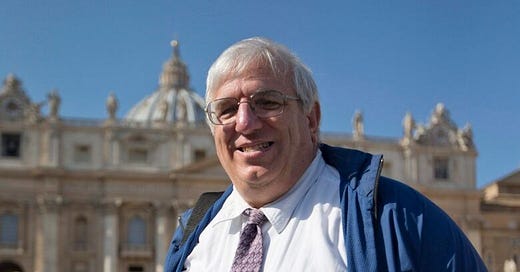


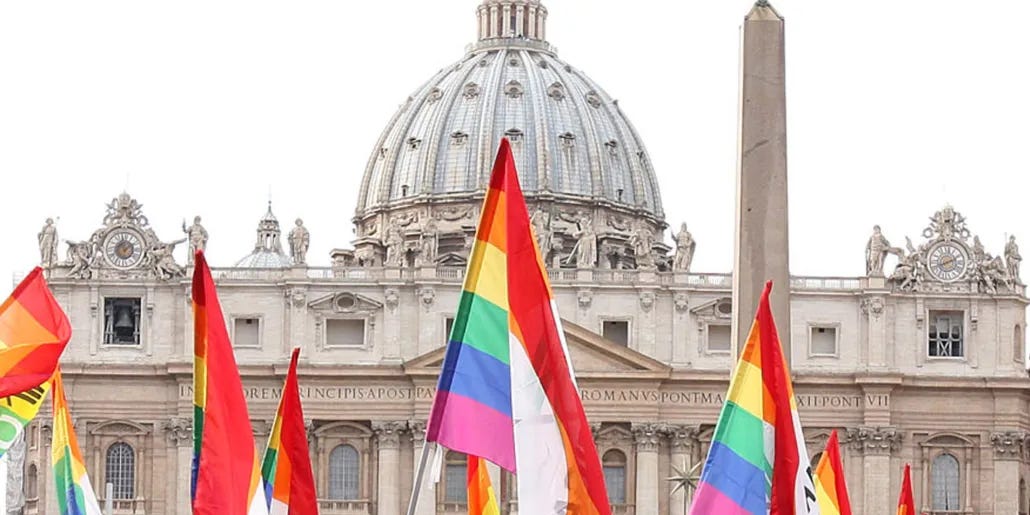
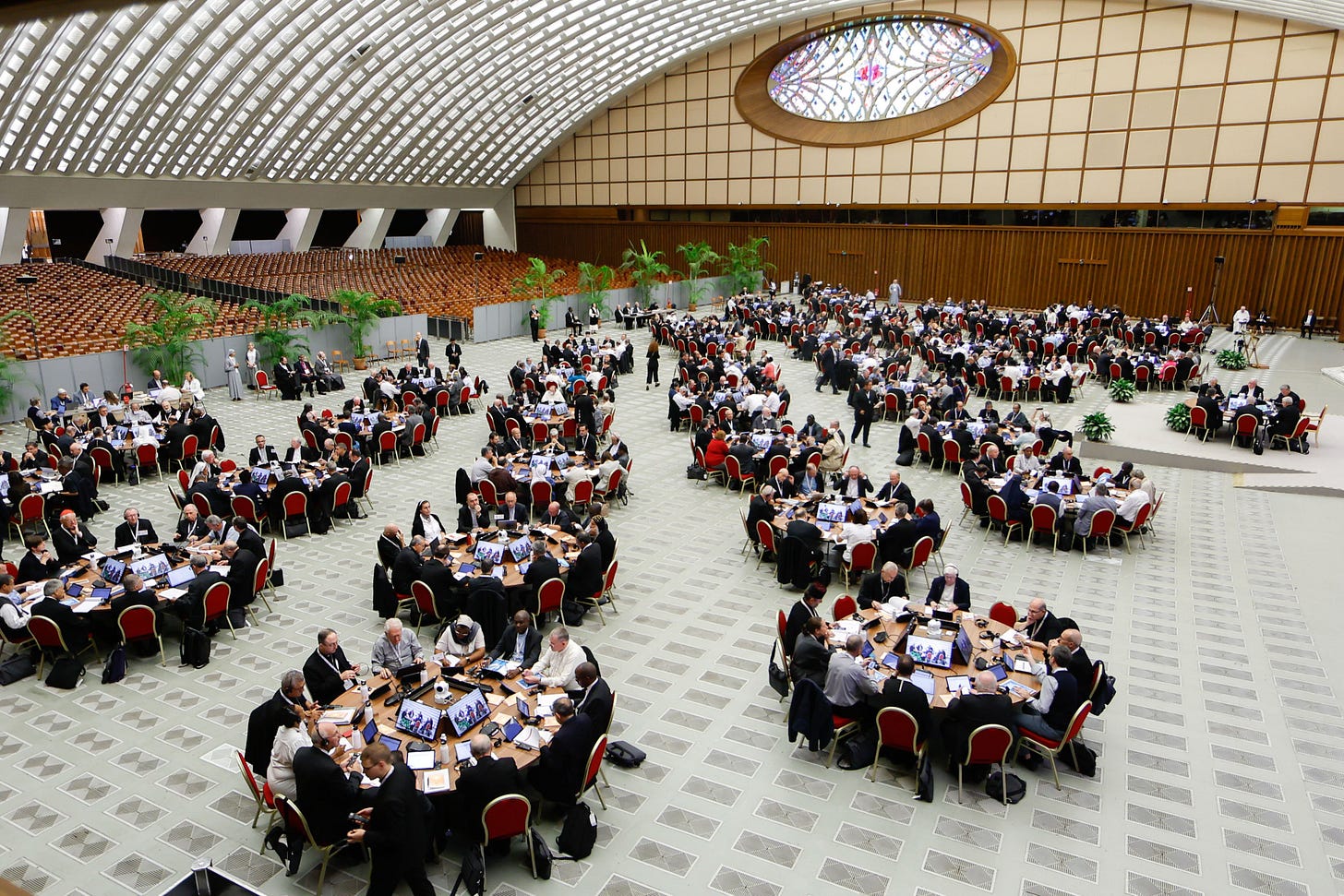
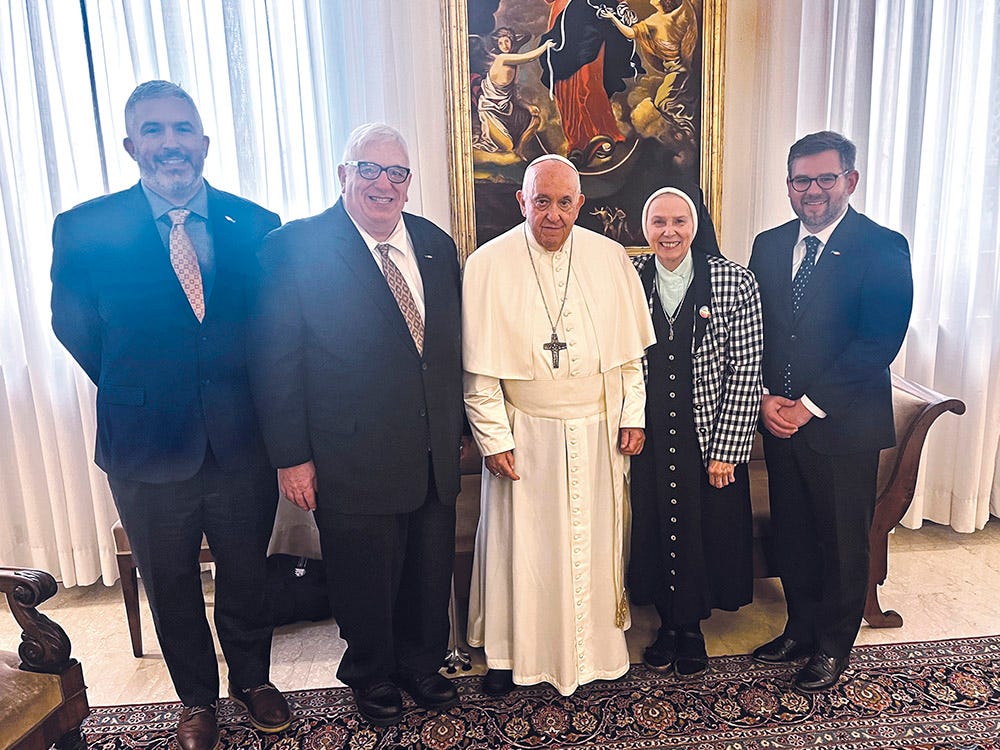
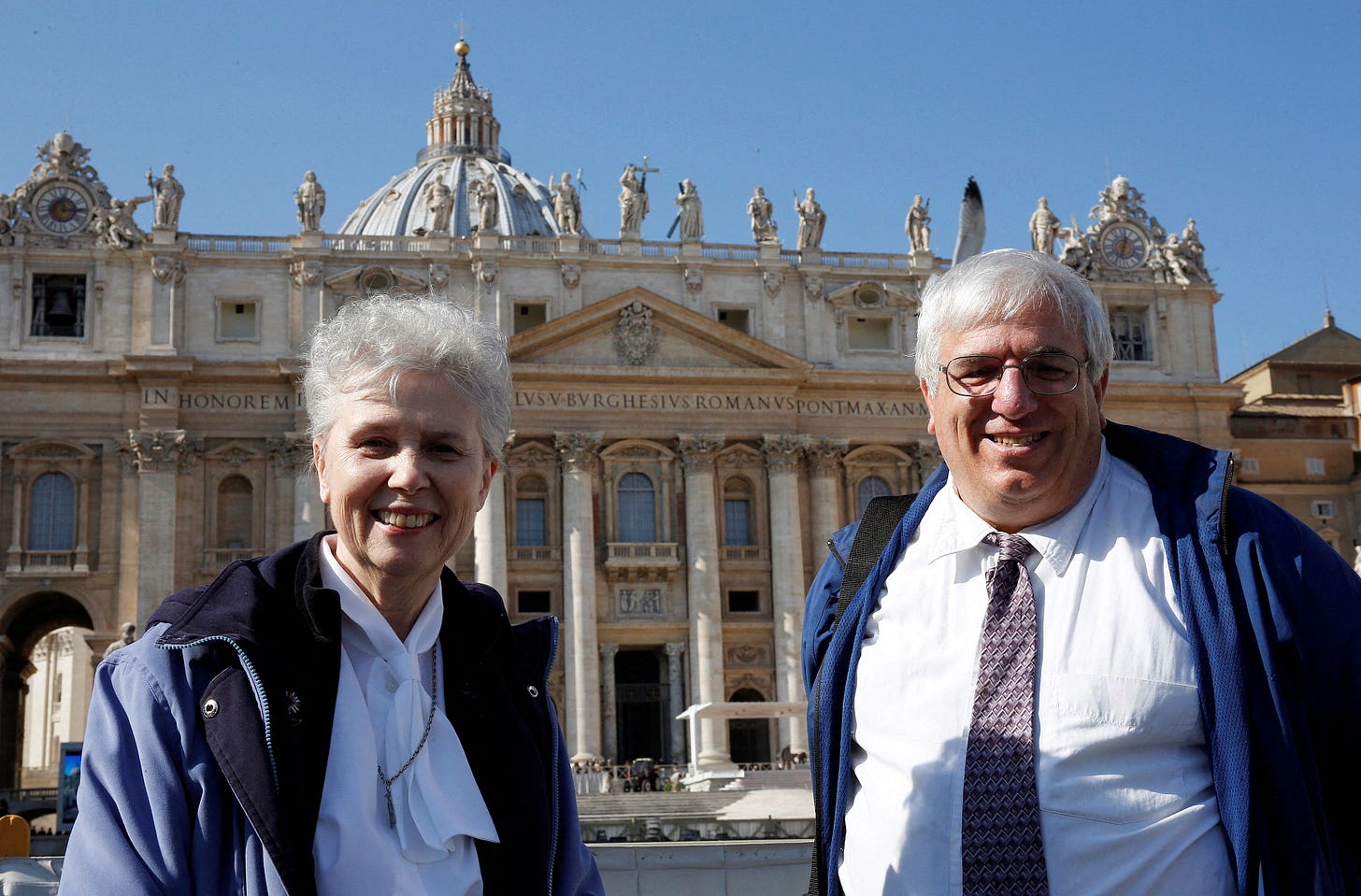
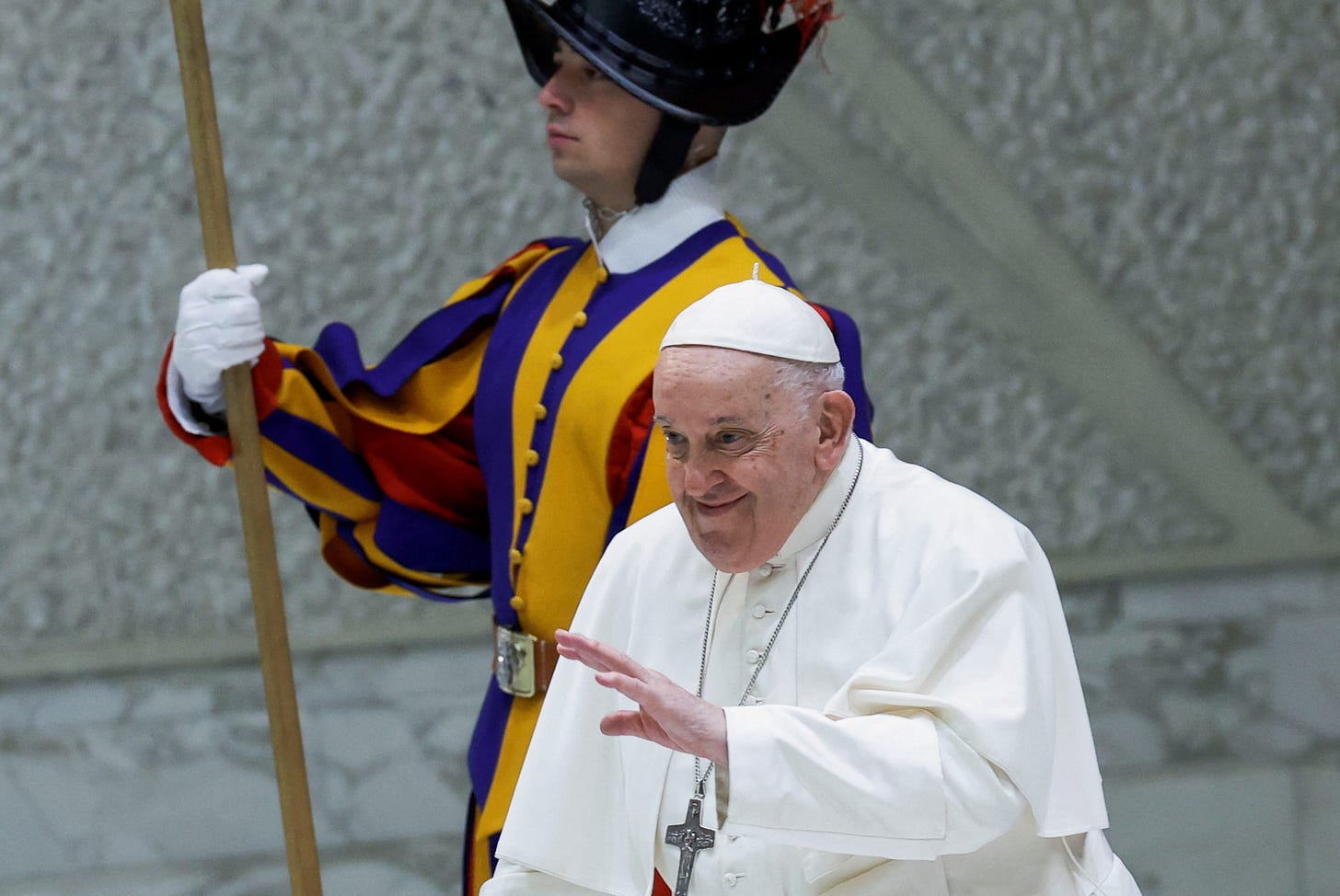
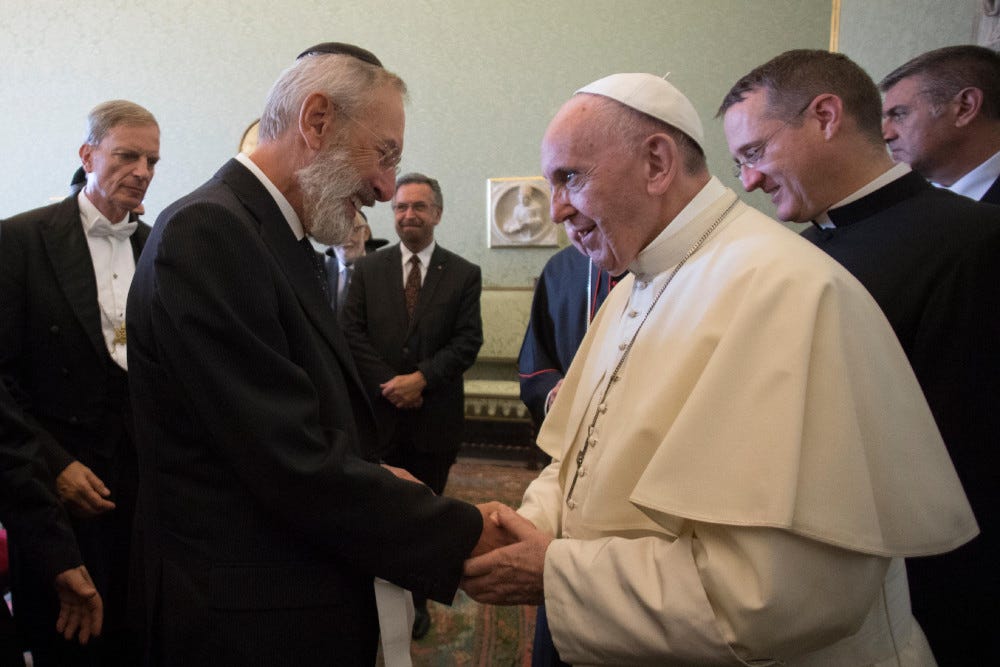
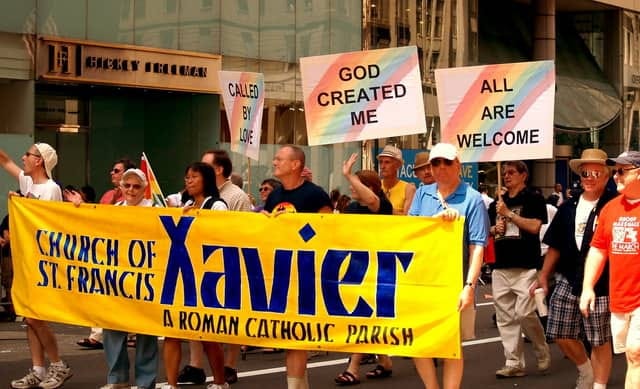
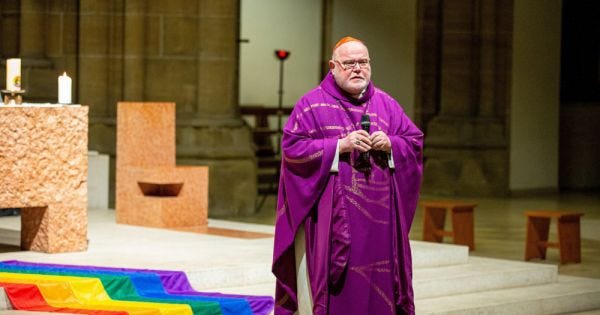
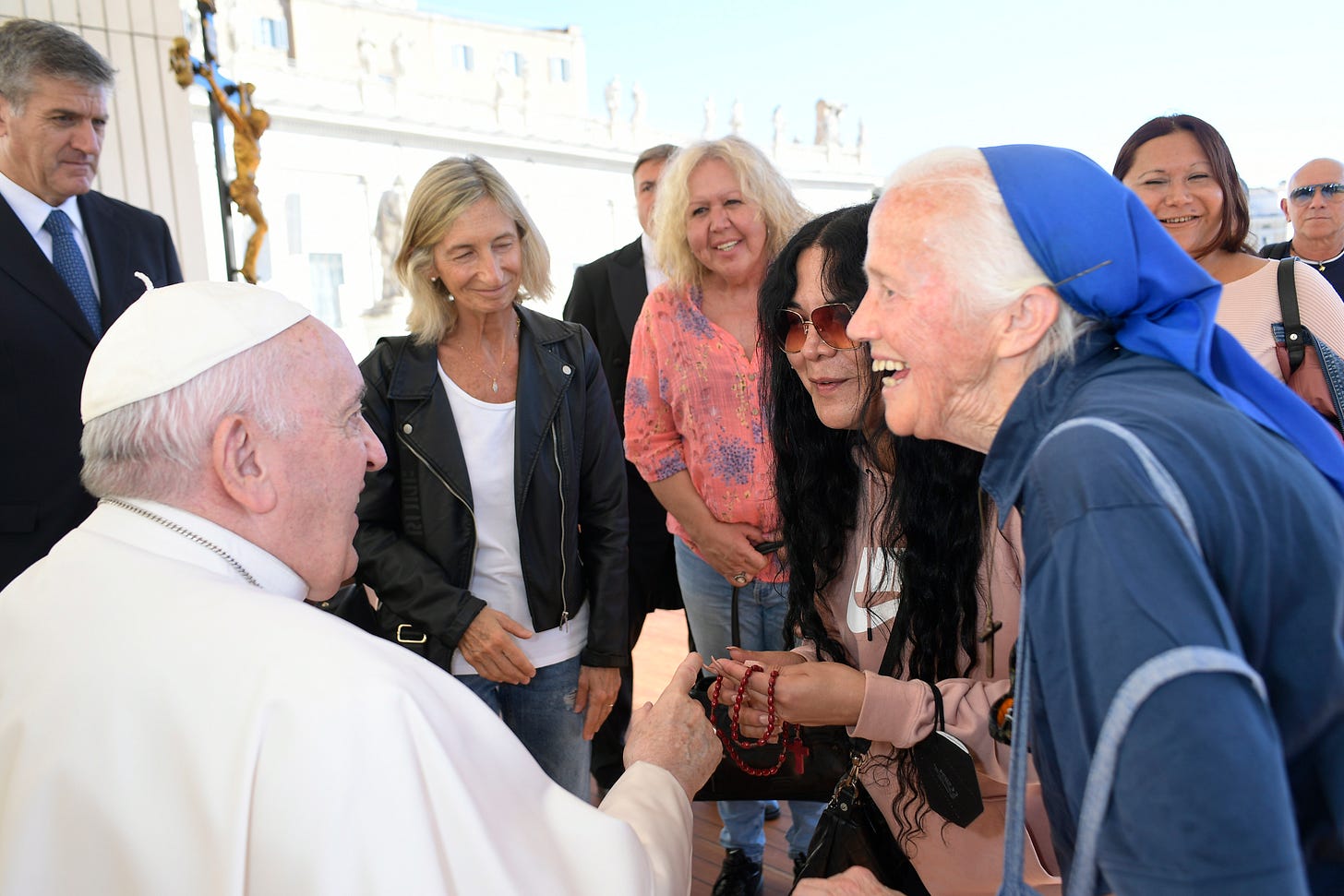
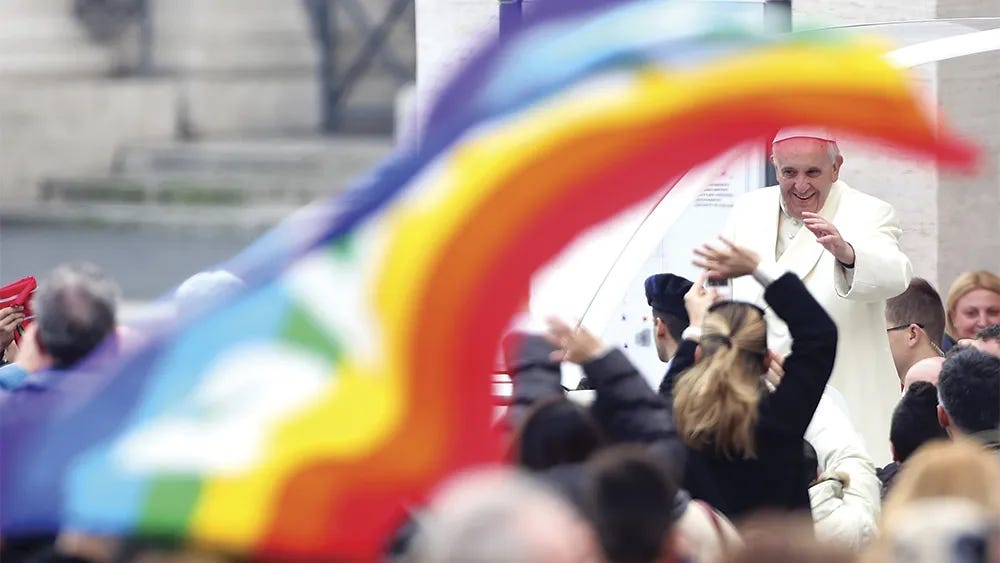
Great interview, Jim. FDB is a smart, witty and patient man.